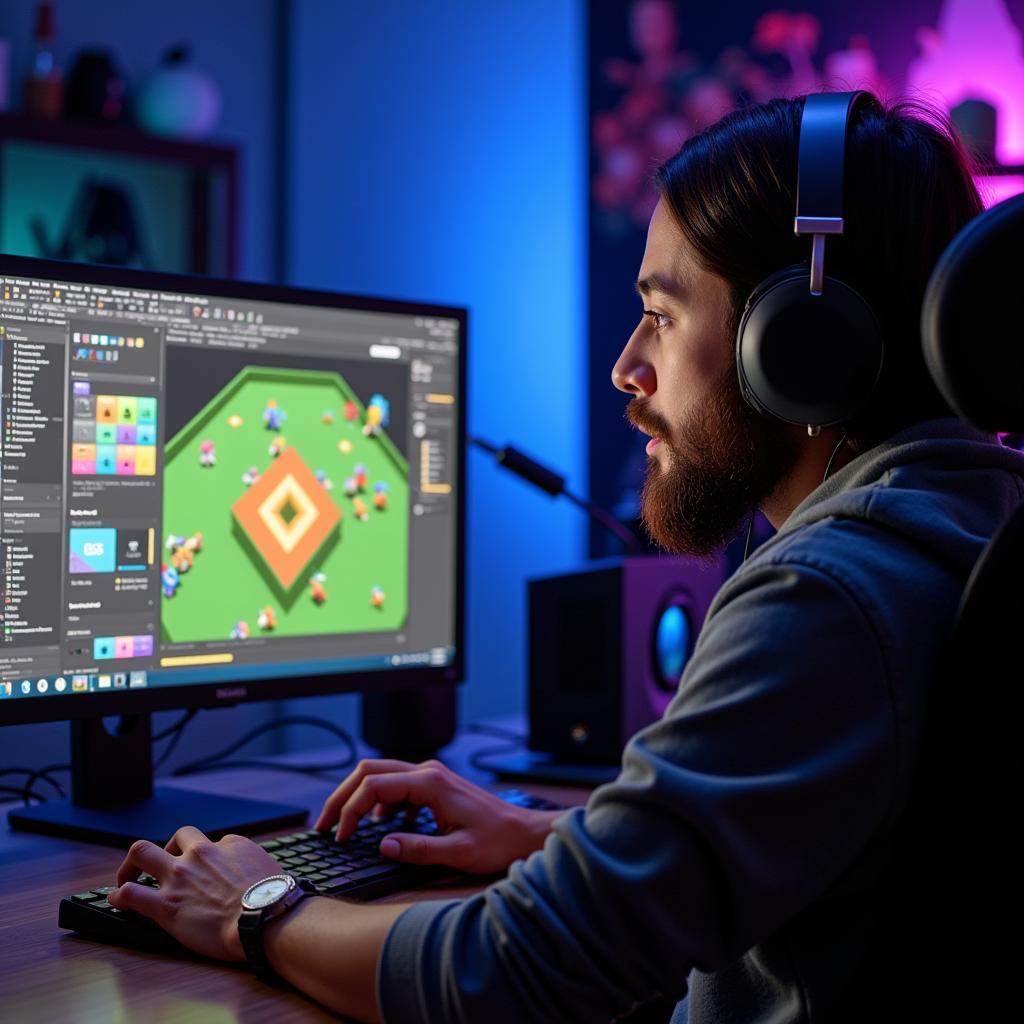Game design is a dream career for many. But what does it actually entail? This guide provides a comprehensive overview of career details of a game designer, covering everything from education and skills to salary expectations and career progression. We’ll delve into the various specializations within game design, the challenges you might face, and the rewards this exciting field offers.
What Does a Game Designer Do?
Game designers are the architects of the virtual worlds we love to explore. They’re responsible for the creative vision, gameplay mechanics, and overall experience of a game. This involves crafting compelling narratives, designing engaging challenges, and balancing the various elements to create a cohesive and entertaining product.
Key Responsibilities of a Game Designer
- Concept Development: Brainstorming and developing initial game concepts, including story, setting, characters, and core gameplay mechanics.
- Level Design: Creating and populating game levels with challenges, obstacles, and rewards, ensuring a smooth and engaging player experience.
- System Design: Developing and balancing game systems, such as combat, progression, and economy, to ensure fairness and fun.
- Narrative Design: Crafting compelling stories and dialogue that immerse players in the game world and enhance the emotional impact.
- User Interface (UI) and User Experience (UX) Design: Designing intuitive and user-friendly interfaces that enhance player interaction and navigation within the game.
- Playtesting and Iteration: Testing the game throughout development, gathering feedback, and making adjustments to improve the gameplay experience.
Educational Pathways and Essential Skills
While a formal degree isn’t always required, a bachelor’s degree in game design, computer science, or a related field can provide a solid foundation. However, a strong portfolio showcasing your design skills and passion for games is often more valuable than formal qualifications.
Essential Skills for a Game Designer
- Creativity and Imagination: The ability to generate original ideas and envision engaging game worlds.
- Problem-Solving Skills: The ability to analyze complex systems and develop creative solutions to design challenges.
- Communication and Collaboration: Working effectively with other team members, such as programmers, artists, and producers.
- Technical Proficiency: Familiarity with game engines and development tools.
- Passion for Games: A deep understanding and appreciation for the art of game design.
 Game Designer Utilizing Software to Develop Game
Game Designer Utilizing Software to Develop Game
Career Progression and Salary Expectations
Entry-level game designers typically start as junior designers or associate designers, working under the guidance of senior designers. With experience and demonstrated skill, they can progress to senior designer roles, lead designer positions, and even creative director roles.
Salary expectations vary depending on experience, location, and company size. Entry-level positions typically offer salaries in the range of $40,000 to $60,000 per year, while senior designers can earn upwards of $100,000 or more.
Specializations within Game Design
Game design is a diverse field with various specializations. Some designers focus on specific game genres, such as RPGs or strategy games, while others specialize in specific aspects of game development, like level design or narrative design.
Common Game Design Specializations
- Level Designer: Focuses on creating engaging and challenging game levels.
- Narrative Designer: Develops compelling stories and dialogue.
- Systems Designer: Designs and balances game systems, such as combat and progression.
- AI Designer: Develops the artificial intelligence that governs non-player characters (NPCs).
- UX/UI Designer: Designs user-friendly interfaces and ensures a positive player experience.
Challenges and Rewards of a Game Design Career
The game design industry is competitive and demanding. Long hours, tight deadlines, and the pressure to deliver high-quality products are common challenges. However, the rewards can be immense. The opportunity to bring your creative visions to life, contribute to a thriving industry, and entertain millions of players worldwide is a powerful motivator for many aspiring game designers.
Conclusion
A career in game design offers a unique blend of creativity, technical skill, and collaboration. While the path can be challenging, the rewards are substantial for those with passion, dedication, and a genuine love for games. This guide on career details of a game designer provides a starting point for your journey into this exciting field.
FAQ
- Do I need a degree to become a game designer? While a degree can be helpful, a strong portfolio and demonstrable skills are often more important.
- What software do game designers use? Game designers utilize a variety of software, including game engines like Unity and Unreal Engine, as well as design tools like Photoshop and 3D modeling software.
- What is the average salary of a game designer? Salaries vary depending on experience and location, but entry-level positions typically range from $40,000 to $60,000 per year.
- What are the different specializations within game design? Specializations include level design, narrative design, systems design, AI design, and UX/UI design.
- What are the biggest challenges in game design? Challenges include long hours, tight deadlines, and the pressure to deliver high-quality products.
- How can I improve my game design skills? Practice creating games, experiment with different game engines, and seek feedback from other designers.
- What are the job prospects for game designers? The game industry is growing, creating increasing demand for skilled game designers.
Need support? Contact us via WhatsApp: +1(641)206-8880, or Email: [email protected]. Our customer service team is available 24/7.

Leave a Reply